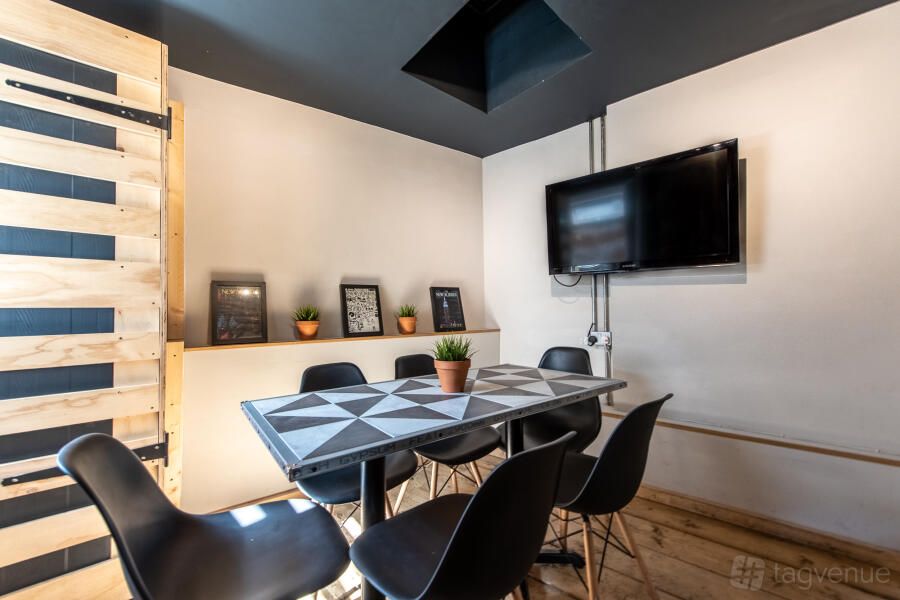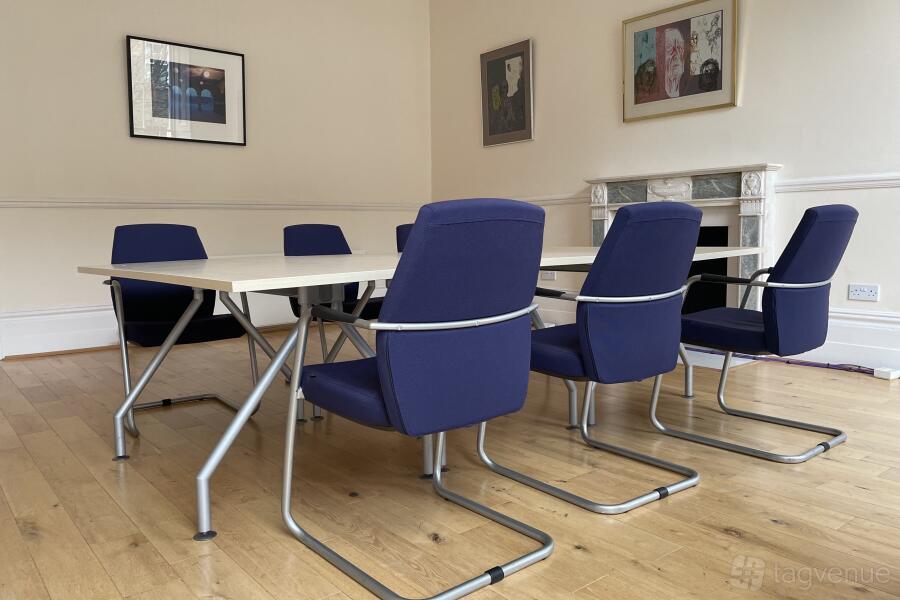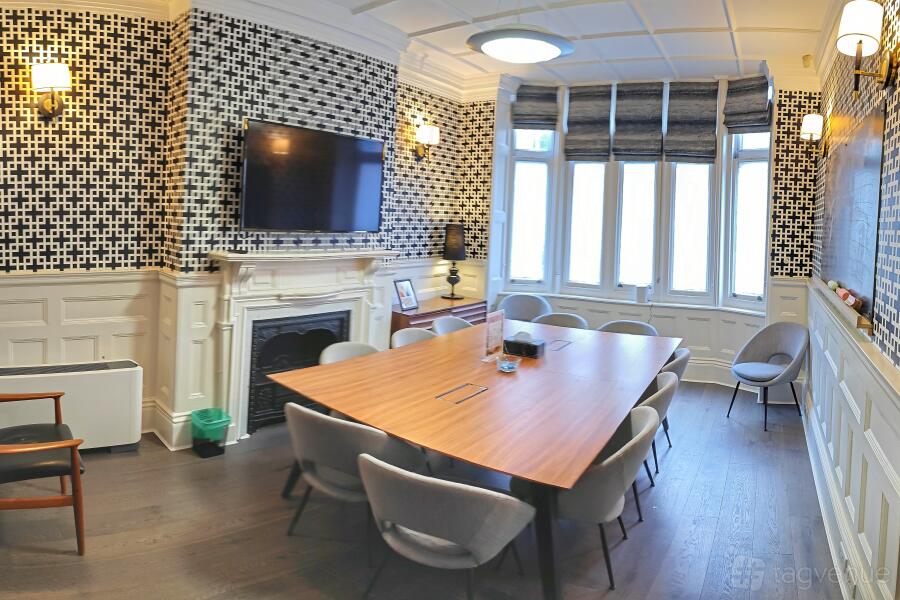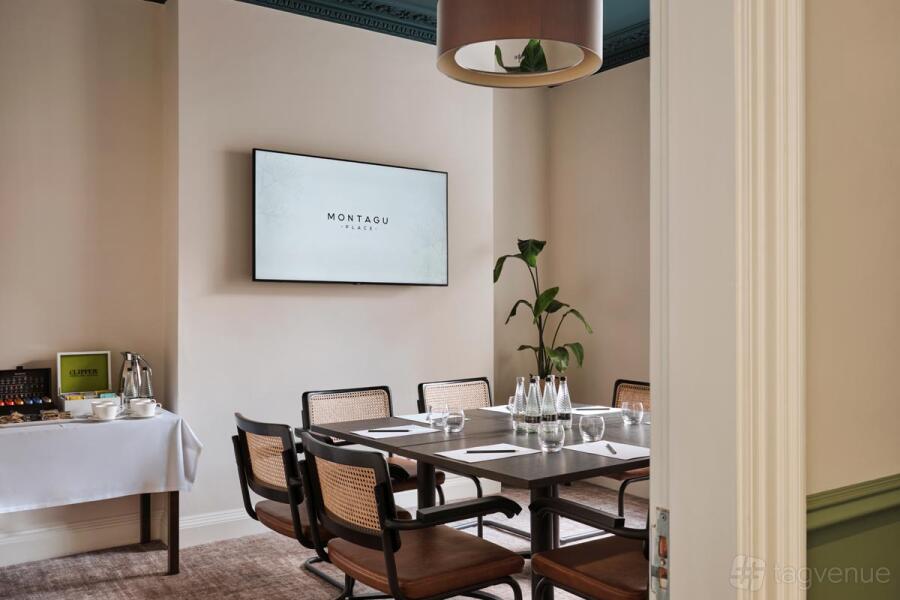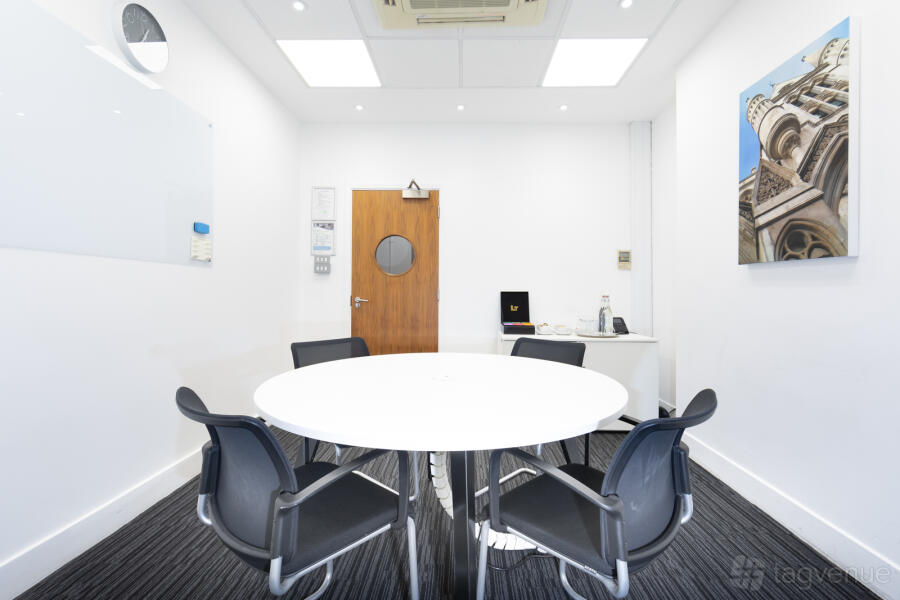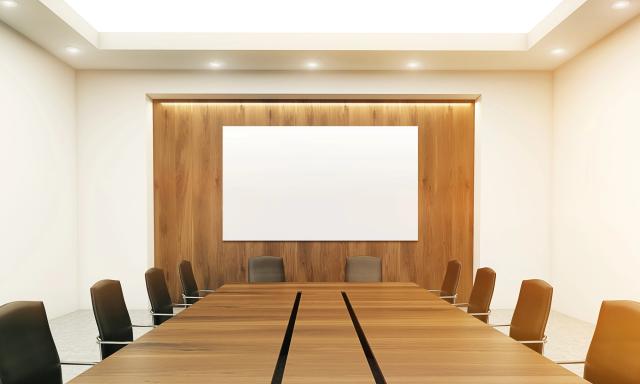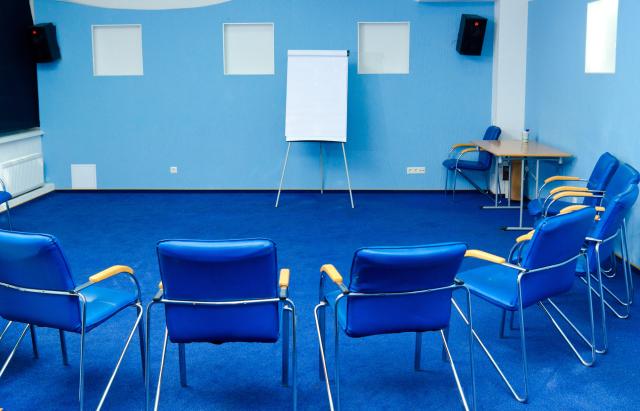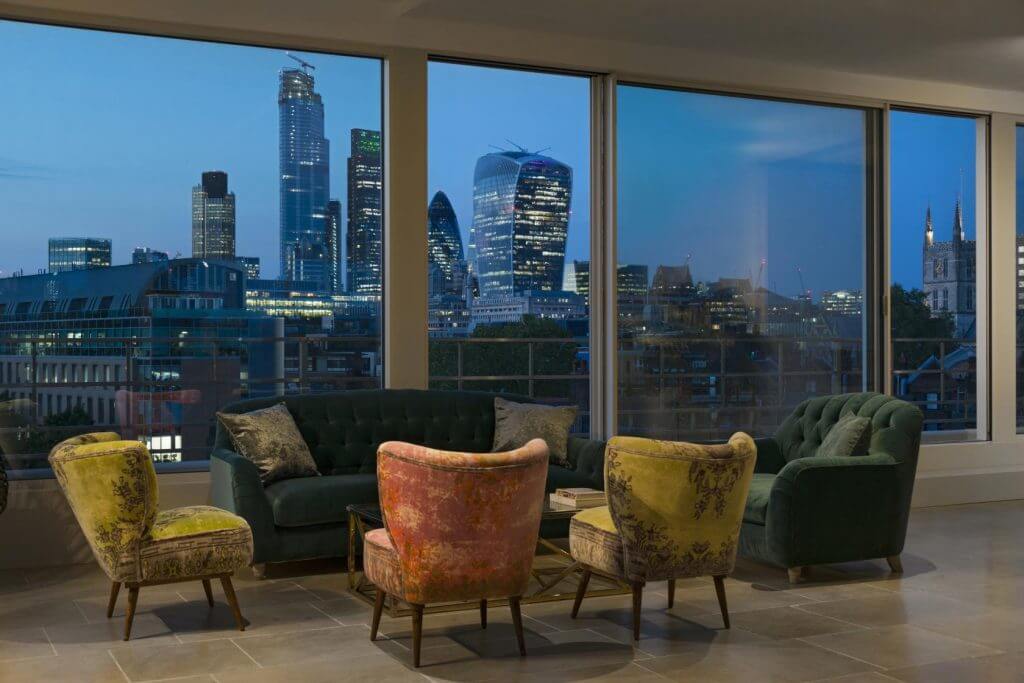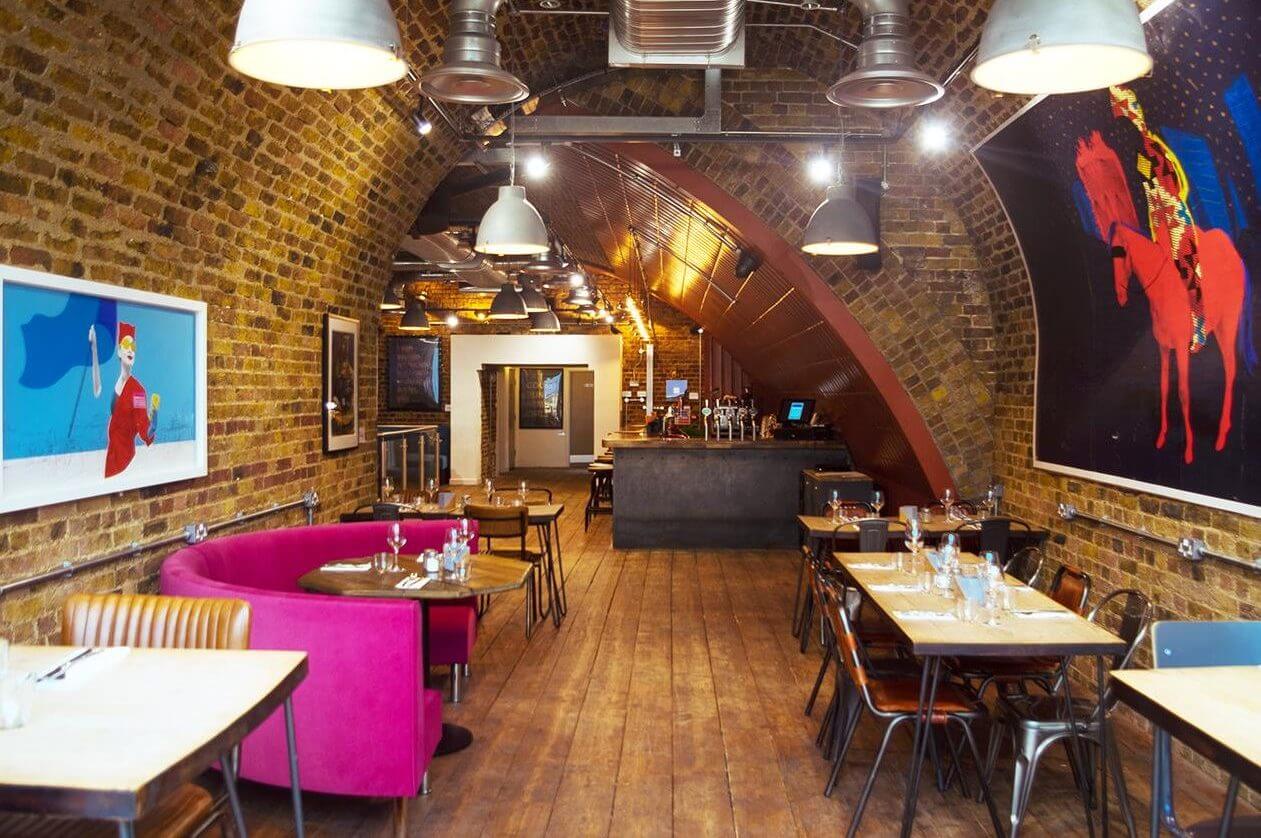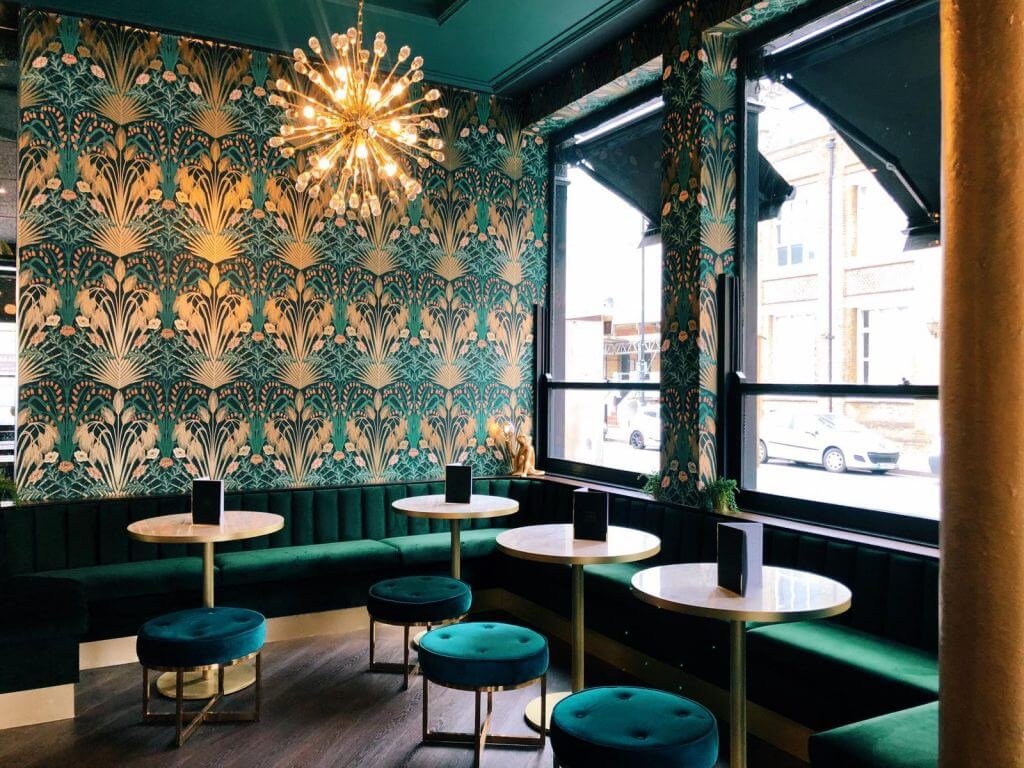Top Small Meeting Rooms in London
If you're searching for small meeting rooms to hire in London, you've landed in the perfect spot! This vibrant city, steeped in history, offers a unique blend of rich heritage and cutting-edge technology, making it an ideal destination for your next gathering. Whether you're a budding entrepreneur connecting with your latest investor, an established professional engaging with a loyal client, or a group of like-minded individuals collaborating on a fresh project, London has a diverse range of small meeting spots to accommodate your needs. Use our search feature, specify your requirements, and easily secure your cosy meeting venue in London!
-
from £30
hire fee / per hourBook nowFrequency Meeting Room
4 guestsFrequency Kings CrossKing's Cross St. Pancras StationSt Pancras, London#Supervenue
CClaire
“Great, cost-effective venue for small meetings in Central London (with fantastic coffee too)” -
from £30
hire fee / per hourBook nowMeeting Room in near Waterloo
6 guestsThe Travel Cafe WaterlooLambeth North StationSouth Bank, London#Supervenue
PPhillip A.
“Wonderful, comfortable and elegant site for a small meeting. Superlative service :-)” -
from £30
hire fee / per hourBook nowFrequency Large Meeting Room
6 guestsFrequency Kings CrossKing's Cross St. Pancras StationSt Pancras, London#Supervenue
NNicholas S.
“The room was cool, spacious, and fit for purpose as a small meeting space.” -
from £22
hire fee / per hourBook nowMeeting / Conference Room
7 guestsMeeting Room Brick Lane / near Liverpool StAldgate East StationSpitalfields, London#Supervenue
SSteve C.
“I used it as an office for the day, but would work for a small meeting.” -
from £27
hire fee / per hourBook nowMeeting Room
8 guestsElectric MarketingChancery Lane StationHolborn, London#Supervenue
AAntonia A.
“This is our favourite meeting venue in London, and we frequently book this venue as and when we need to.” -
from £60
hire fee / per hourBook nowMeeting Room Classic
12 guests54 Welbeck St W1G 9XSBond Street StationMarylebone, London#Supervenue
SSd
“Location Would like to see the Classic room next time as this was fully booked for our meeting.” -
from £44
hire fee / per hourBook nowNorfolk Suite
6 guestsMercure London PaddingtonPaddington StationPaddington, LondonSSteve K.
“Good location - perfect to a small meeting of 5 people. Easy to arrange and confirm” -
from £50
hire fee / per hourBook nowMeeting Room
8 guestsMontagu Place HotelMarylebone StationMarylebone, London#Supervenue
EEmily N.
“Nice, helpful staff. Really good venue for a professional but warm meeting. Location also great.” -
from £60
hire fee / per hourBook nowCREO, Meeting Room 1
8 guestsMary Sheridan HouseLondon Bridge StationSouthwark, London#Supervenue
AAmber S.
“Gorgeous venue, great for customer meetings or team building events. Will definitely be booking again.” -
from £30
hire fee / per hourBook nowMeeting Room 2
8 guestsThe Travel Cafe LoungeLambeth North StationWaterloo, London#Supervenue
NNatalie K.
“Convenience of location - meeting room was really clean, light and airy.” -
from £30
hire fee / per hourBook nowMeeting Room 1
6 guestsThe Travel Cafe LoungeLambeth North StationWaterloo, London#Supervenue
VVerity S.
“The travel cafe is an excellent meeting space…great quiet and private room and beautifully presented.” -
from £57
per person / per dayBook nowMadrid
4 guests83 Victoria StreetSt. James's Park StationWestminster, London#Supervenue
KKaren C.
“Great venue for meetings. Clean, well resourced and quiet. I have already re-booked.”
- 1
- 2
- 3
- ...
- 177
Popular filters
Capacity
Budget
Area type
Venue type
Catering and drinks
Accessibility features

FAQs about Top Small Meeting Rooms in London
In London, prices of small meeting rooms average around £50 hire fee per hour. The exact costs depend on the room size, audiovisual equipment (such as projectors or microphones), or high-speed Wi-Fi. Additional services, such as catering or on-site coordinators, may cost extra. Flexible configurations for presentations, workshops, or networking, along with amenities such as parking or dedicated breakout rooms, will also affect the price. See usual price ranges in London, based on Tagvenue data, as of February 2026:
| From £30 | to £83 | hire fee per hour |
| From £64 | per person | |
| From £450 | to £588 | hire fee per event |
Based on the popularity and user ratings on Tagvenue (updated February 2026), the best options include:
-
Meeting Room in near Waterloo at The Travel Cafe Waterloo in South Bank - rated 4.9/5
Our user said: ‘Wonderful, comfortable and elegant site for a small meeting.’ -
Meeting Room at Electric Marketing in Holborn - rated 4.9/5
Our user said: ‘This is now our go to meeting room in London. Fabulous location, great price and facilities. Cannot fault.’ -
Meeting / Conference Room at Meeting Room Brick Lane / near Liverpool St in Spitalfields - rated 4.7/5
Our user said: ‘We booked the meeting room extremely last minute but the team were still ready to accommodate us completely.’
These are the venues within 0.9 mi from central London, available to book on Tagvenue:
-
Madrid at 83 Victoria Street
on 83 Victoria Street - 0.4 mi from centre.
Our user said: ‘I was actually in London Meeting room so did not see Madried but have no issues there either.)...’ -
Meeting Room in near Waterloo at The Travel Cafe Waterloo
on 139 Westminster Bridge Road - 0.8 mi from centre.
Our user said: ‘Wonderful, comfortable and elegant site for a small meeting.’ -
Meeting Room 2 at The Travel Cafe Lounge
on 119 Lower Marsh - 0.9 mi from centre.
Our user said: ‘Excellent venue and very comfortable meeting room with great service.’
The heart of London’s business, the City, is a great spot to start searching for a small meeting venue. If you want to look for a venue in an area that can be easily accessed from anywhere, look around King's Cross St Pancras station. If your guests are arriving by plane, search for a venue near Gatwick or Heathrow, or the airport where your guests will be arriving. Consider South London for more affordable options and Central London for a more luxurious experience.
Professional meeting rooms come fully equipped to cater to all your needs. A typical small meeting room may have wi-fi, whiteboard, flipchart, flatscreen TV, and conference call facilities. Some rooms may offer extra refreshments, like tea or coffee, or catering options. To make sure your meeting room has everything you need don’t hesitate to contact the venue manager to ask for the details.
Many small conference rooms in London come equipped with comprehensive audiovisual (AV) systems to meet your event's technical needs. This includes projectors, screens, sound systems, microphones, and other essential AV equipment that come as part of your hire package.
If you are unsure about how to support connectivity and tech issues during your event, you may need the help of a professional. Some venues provide A/V teams who can assist with setup and troubleshooting during your event to ensure everything runs smoothly. Before making your booking, ask the venue manager or event coordinator about the specific AV services available at your chosen venue.
Hiring a small meeting space has a lot of advantages. You can look for a private spot in London that will be easily accessible to all your guests. You can choose a meeting venue that will have all the equipment you may need without having to invest in it on your own. Hiring an outside meeting room may give your colleagues or employees a change of scenery. Moreover, comfortable small meeting rooms cater to the comfort of all guests and allow for a more private atmosphere.
Your Guide to Hiring Small Meeting Rooms in London
London’s a powerhouse for quick strategy sessions, pitching to investors, or running a team training day. With six major airports and excellent public transport, it's the go-to city for professionals across the UK and beyond. And when it comes to booking small meeting rooms in London, there are many options available for hire. Central London for accessibility, South London for affordability, but knowing what to look for makes all the difference.
How to Make the Most of Your Small Meeting Venue
Before you start searching for a meeting space, take a moment to get clear on the basics. What’s the purpose of the meeting? Are you brainstorming ideas, solving a problem, or training your team? Defining your goal helps you plan more effectively and choose the right venue setup.
Next, think about who needs to be there. A smaller group means easier scheduling, more focused conversations, and a better fit for compact meeting rooms. Once your guest list is set, draft a simple agenda to keep things on track and to make sure you’re not trying to squeeze too much into too little time.
Finally, get ahead on any prep work. Send out documents in advance, ask if the attendees have topics they want to raise, and check for dietary needs if food or coffee’s part of the plan. Once you’ve covered these essentials, you’ll be ready to book a space that ticks all the right boxes.
Things to Consider Before You Book a Small Meeting Room in London
Here’s what separates the good spaces from the ones that leave people checking their watches.
- Location that makes sense: If your guests are coming in from out of town, book a space that is close to a Tube station or train lines.
- The right size and layout: Yes, you want a small room. But not so small that people feel squeezed in. Need a collaborative setup? Go for a roundtable or modular seating. More casual one-on-one? A few comfy chairs and a coffee table might be all you need.
- Comfortable chairs: People shouldn’t be thinking about their backs during a meeting. Whether it’s upright chairs for a boardroom feel or sofas for a creative session, comfort affects focus.
- Tech that actually works: Reliable Wi-Fi is non-negotiable. You’ll also want screens, whiteboards, video conferencing tools, and whatever helps you run the meeting without hiccups.
- Natural light and air flow: Bright spaces feel better. It as simple as that. Bonus if you can open a window or control the temperature. If you're presenting, check if the space has blinds so you can manage screen visibility.
- Coffee, snacks, or more: Even in a short meeting, people appreciate refreshments. Look for venues with a kitchenette, coffee station, or nearby cafes. If you’re including a meal, check for catering options or pick a spot close to good lunch spots.
- Flexibility on time: If your meeting might run early or late, or you’re dialling in with overseas partners, check the venue's opening hours. Some offer cheaper rates outside of peak hours, too.
- Quiet surroundings: City noise can ruin a great meeting. Ask about soundproofing, especially near airports or train stations. You want your team to focus, not fight to hear each other.
- Style that fits the tone: No need to go overboard, but a clean, professional space helps set the mood. If you’re planning to snap some photos or host clients, a nice backdrop never hurts.
- If your guests are arriving by car, make sure the meeting location can be found on GPS and that there's a parking lot where they can leave their vehicles.
Top-Rated Small Meeting Rooms in London
To make your search easier, look through our list of suggested small meeting rooms:
- The Worker's League (Old Street / Liverpool St): This is a light-filled coworking space with private rooms, breakout areas, and a fully equipped kitchen. It is great for focused work or relaxed sessions. venue.
- Paddington Works: The venue offers flexible meeting spaces with high-end AV and modern design. It is just a short walk from Paddington Station which is super convenient for out-of-town guests.
- Sutherland Labs (Covent Garden) - A creative warehouse space that’s modular and tech-ready. Perfect if you want something inspiring but still professional.
- St Martin room at French Protestant Church of London (Soho) - You can host up to 40 people here. It is air-conditioned, with ultra-fast Wi-Fi. At £250/hr, it’s a great option for presentations and small conferences in a central spot.
- Yellow Room at Remark! Events - If convenience and a central location are important for your business, hire this room in London's EC1 district, just a few minutes walk from Chancery Lane. It is available for £125 per hour.
What To Do After The Meeting Ends?
The meeting doesn't end when the last guest leaves the door. Do a follow-up. Send an email where you summarise the meeting and send the notes or presentations used during it. If any decisions have been made during the discussion, include them in the email to ensure they are straightforward to everyone who attended. If you're planning for the next meet-up, add the details as well. In a follow-up, you may want to ask for feedback to better prepare for your next meetings. Remember to thank everyone for attending the conference.
People also search for
Small Meeting Rooms in nearby suburbs
Small Meeting Rooms in other cities
Verified Reviews of Small Meeting Rooms in London
Event planning ideas in London
Page last updated in February 2026
To provide you with relevant information, our pages are refreshed using an algorithm that aggregates real-time data, including bookings, reviews, and venue updates.
